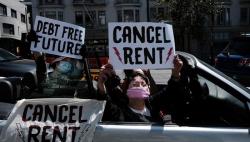By Richard Mellor in California
There is a popular post on the internet, stating correctly that the pandemic has demonstrated three things. One is that the capitalist economy collapses when it is unable to keep selling “useful stuff to over-indebted people”. Another is that it is “perfectly possible to reduce pollution” and the final thing was that the lowest paid people in society (workers) are the most essential.
I agree with all of this, though I would stress that it is not possible to eliminate debt or pollution within the confines of the capitalist economic system of production.
And the pandemic has done much more. The capitalist mode of production has conquered the world. But here in the US we are in the belly of the beast. The market is God. It is the answer to all things. Human shelter (housing) is a commodity and for thirty of forty years of your existence on this earth you can be indebted to investors in this industry until you finally own the roof over your head, by the time you are lucky enough to retire. You might pay three times the value of your house when interest is included, and the bloodsuckers get their interest up front.
National eviction ban set to expire
The pandemic has exposed the weak underbelly of the capitalist system in the most powerful capitalist country in the world, especially when it comes to health care and human shelter, or housing. As I pointed out in an earlier commentary, the economic future will become even bleaker when the moratorium on evictions hits.
The US ruling class is very concerned about this but are very guarded when they write about it in the mass media. The Wall Street Journal, not an outlet that is directed at the US worker, is a little more open. It warns its readers today that the national eviction ban is set to expire by January or sooner. Up to now, individual landlords, with the assistance from some municipalities and cites, have held off evicting tenants, but that could change rapidly in the next few months.
The WSJ reports that the Philadelphia Federal Reserve Bank reckons indebted renters may owe $7.2 billion by the end of this year. The economic consulting and analysis firm, Moody’s, reckons that could hit $70 billion, if there is no additional stimulus (taxpayer bailouts). This would mean tens of millions of renters would be caught in a “web of home rental debt” as the WSJ puts it.
A quarter of US renters are in arrears
According to the US census, 25% of American renter households with children are in rent debt. Naturally, it is the poor, those not earning enough to buy a home, who are the most affected, and for all the reasons that I do not have time or space to go in to here. Of those poor, women and people of colour are the largest portion. In California, Black and Latinos are facing rent or housing insecurity at twice the rate of whites.
The affect this will have on the economy, among many other negative effects from the pandemic, will be significant as, “30 to 40 million people from New York City to San Francisco face potential eviction…” WSJ quoting fed officials.
As if the pandemic and all its consequences isn’t enough, failing to pay rent hurts ones credit score and makes it even harder, if not impossible, to find other accommodation. In most cities, landlords have a huge influence on local politics. and are often represented on city councils. The largest homeowners and landlords are capital management companies and hedge fund outfits. Housing is an important industry for investors, moneylendersand banks. Like medicine or health care, it is a business and negatively effects the price of shelter as people and companies speculate in housing. One of the most disgusting terms in our lexicon in my opinion is “house flipping” where someone with some extra cash can buy homes, either in bad shape or foreclosed, spend some time and cash on them then “flip” them back in to the market place.
An extra place to rent out
I make a distinction between professional landlords and those workers with better jobs and some good fortune perhaps, who can buy an extra place and rent it out, or someone whose parents die leaving them an extra home that they rent to others. The way the set-up is, is that kind of house is our ‘savings bank’; it helps pay the kids college fees or makes us a little more secure in retirement; it might make paying a visit to the hospital a little easier, as another human being that can’t afford to buy a house pays or contributes to someone else’s income via rent payments.
From the sacrifices of workers since gone
That is why housing, health care social security or retirement, all social necessities like transportation, are all issues we have to take up. Society’s wealth has arisen from the previous labour power, dedication, sacrifice and service of workers since gone. Society can provide these things, it’s not charity; they are our right and given to us by our ancestors.
But if we are provided this type of security, there is a consequence. We will not feel the need to own more property, become landlords, compete with others in order to gain an advantage in the struggle to keep our heads above water, to educate our kids, so they might have a better life than we have. In other words, we will have less stress, more time for human interaction, and space for acts of kindness and so on. We will regain our humanity.
If there’s an argument for the need for social housing the pandemic has made it.
From the US socialist website, Facts for Working People. The original can be found here.
October 29, 2020



